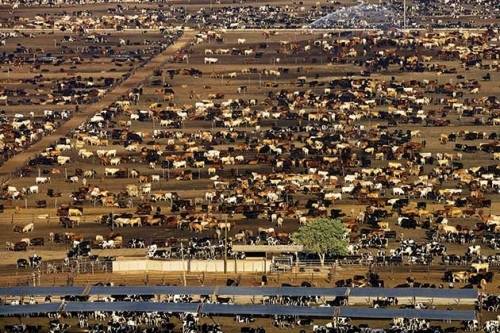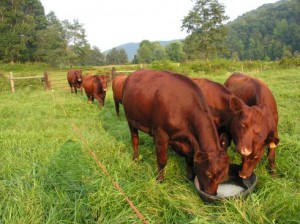
What Did Your Dinner Have For Dinner?
What did your dinner have for dinner?
The answer to that question might be more important than you think. If your dinner meat came from a conventional store, and from a conventional farm, you might prefer to not know the answer.
Jon Taggart, a Texas farmer, described for the Time Magazine how he used to raise his cattle.
[Taggart] crowded his cattle onto pasture sprayed with weed killers and fertilizers. When they were half grown, he shipped them in diesel-fueled trucks to huge feedlots. There they were stuffed with corn and soy–pesticide treated, of course–and implanted with synthetic hormones to make them grow faster. To prevent disease, they were given antibiotics. They were trucked again to slaughterhouses, butchered and shrink-wrapped for far-flung supermarkets. “It was the chemical solution to everything,” Taggart recalls.
Sometimes, cattle are even fed parts of other cows, dead horses, chicken manure, and more. Barf.
Now, Taggart has completely changed his operation.
“He has restored his 1,350 acres in Grandview, Texas, to native tallgrass prairie, thus eliminating the need for irrigation and chemicals. He rotates his cattle every few days among different fields to allow the grass to reach its nutritional peak. And when the steers have gained enough weight, he has them slaughtered just down the road. Finally, he and his wife Wendy dry-age and butcher the meat in their store, Burgundy Boucherie. Twice weekly, they deliver it to customers in Fort Worth and Dallas.”
Sounds good to me!
Being selective about the source of your meat could yield you a slew of health benefits and save you money in doctor bills in the long run! Research shows that eating grass-fed beef instead of grain-fed would yield a weight loss of 6lbs over a year, even if nothing else changed. Grass-fed beef has about the same fat ratio as fish does, making it a healthy choice for dinner!
Plus, when you choose organic, grass-fed beef, you are saying goodbye to pesticides, hormones, and antibiotics that only cause damage to our bodies.
When you’re shopping for meat, be careful to look for grass-fed, and not just organic. It’s best if you can get your meat locally. If you’re in the DFW area, I can recommend a great co-op with excellent prices!
Choose grass-fed and you can enjoy your steaks or burgers with no remorse. 🙂
Join us at Monday Mania & Frugally Sustainable!



2 Comments
Rachel Holland
We made the switch to mostly grass-fed this past year and you can definitely taste the difference! Yes, it’s a ton more expensive, BUT if you use it along with beans in recipes then the 1 lb. of grass-fed ground meat can really go a long way!
Jacinda @ Growing Home
We just watched the movie Fresh and we’re so disgusted to discover exactly what you’re saying here! Cows who eat other cows get can Mad Cow disease. *shudder*